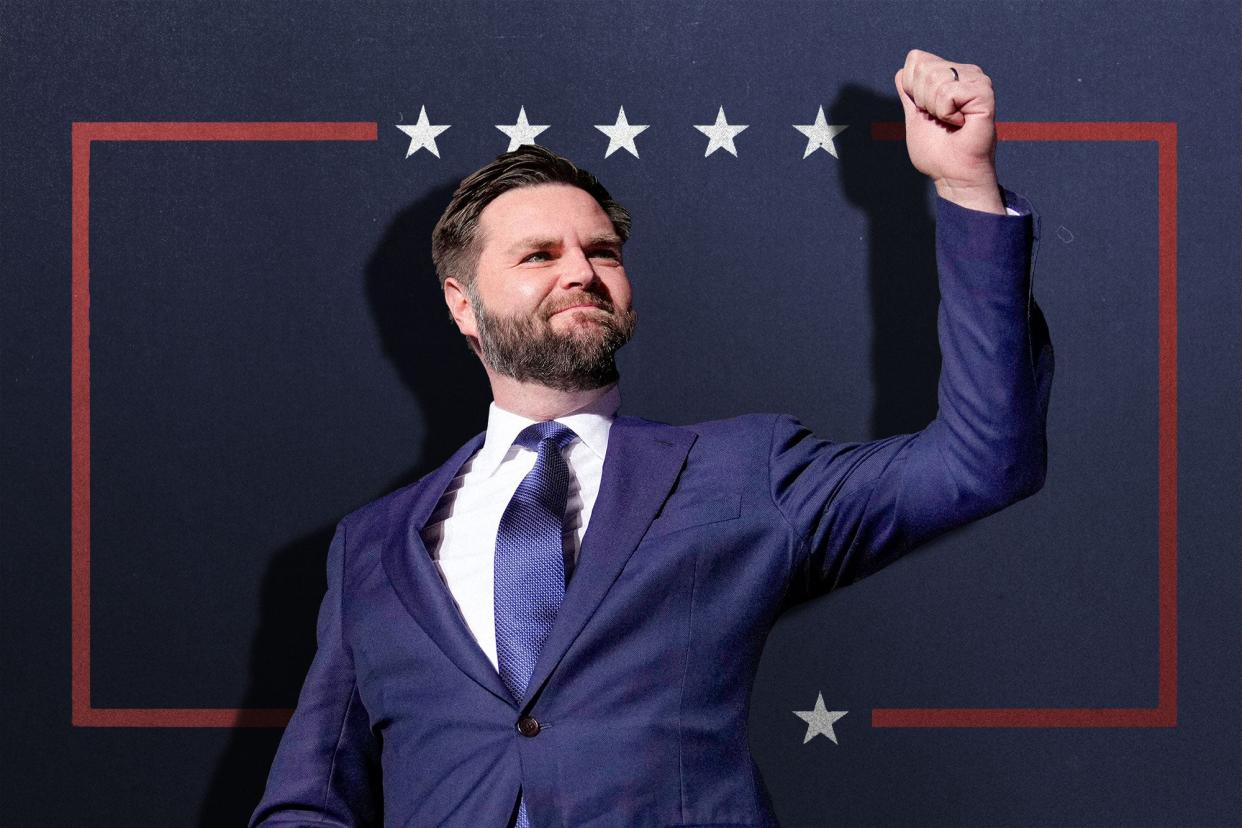Why J.D. Vance Is a Particularly Notable Choice for Trump’s VP

After much speculation—and nearly as much self-abasement from a long line of Republican hopefuls—Donald Trump finally added a vice presidential pick to his 2024 ticket: Ohio junior Sen. J.D. Vance.
The 39-year-old venture capitalist turned political firebrand beat out a pack of aspirants that included Florida Sen. Marco Rubio, North Dakota Gov. Doug Burgum, and, perhaps at one point, South Dakota Gov. Kristi Noem—until she wrote in her memoir that she shot her puppy and met Kim Jong-un. (And let’s never forget Trump’s interest in Florida Rep. Byron Donalds!)
Vance’s ascent is particularly notable because he was vocally opposed to Trump’s 2016 run, calling him an “idiot,” a “moral disaster,” and “a cynical asshole like Nixon” before having some sort of epiphany and doing an about-face. (This has been a theme of his short public-sector career.)
Vance is perhaps the foremost political representative of the “new right,” the strain of populist conservatism that has appeared to gain some purchase with younger Republicans in recent years. These politicians (Josh Hawley is another) prioritize a kind of traditional social conservatism—i.e., they like eroding the rights of women and other archnemeses among the “childless left”—with economic ideas that sound as if they back the working class: protectionist trade policy and support for unions. And yet: the follow-through on this class warfare somehow manages, time and again, to spare the rich and corporate executives.
Vance is also close to a newer brand of Silicon Valley conservatism that is more recently ascendant in the GOP, best embodied by new arch-right zealots like venture capitalist and podcaster David Sacks. Vance owes his senatorial seat in part to another right-wing V.C., Peter Thiel, who pumped $10 million into a flagging campaign to help Vance secure the nomination in 2022.
Although the frenzy around a vice presidential pick is usually pretty politically inconsequential, in this case it might be meaningful. Trump is already 78 years old and just got shot over the weekend. He’s running for a term that would extend until 2029. It would not be inconceivable to see Vance in the driver’s seat of this presidency if the two of them beat out Biden-Harris in November.
It’s an interesting turn. Vance owes his ascent not just to rich conservatives in the Valley; he would never have built a public profile if not for a warm embrace from reputedly liberal institutions. Both the publishing industry, which purchased and promoted his memoir Hillbilly Elegy all the way to bestseller status, and the Hollywood studios that bought its rights and made it into an award-nominated movie starring Amy Adams, put Vance’s name into lights.
That was, of course, before Vance made his splashy and convenient turn against liberal institutions (despite having gone to Yale Law School, working in tech investing, and, to this day, living in an elite, liberal neighborhood—the list of hypocrisies goes on, but you get the idea).
Vance, who shares Trump’s positions on mass deportations, tariffs, and foreign policy, sends a very strong message about where the Republican Party is headed under Trump’s reconsolidated control. This is certainly not a party beholden to free marketeers, at least at the very top.
And although Democrats don’t currently seem to be terribly motivated to try and win this election, the pick may come as something of a relief for them. Vance is exactly the sort of candidate whom suburban women have, in recent years, found electorally detestable. As the Biden team attempts to cobble together anything resembling a winning coalition, keeping those voters in the fold will be paramount, and Trump’s picking Vance makes it much easier for the campaign to do so. As evidence: Vance’s website reads “END ABORTION,” in all caps.
In 2022, when Vance was running for his Senate seat, he ran way behind fellow Republican Mike DeWine statewide; DeWine won the governor’s race by 25 points, while Vance beat his Democratic rival by only 6.5.
Members of Trump’s team, however, aren’t worried about a drag on the ticket; based on the polling they, and seemingly everyone except Joe Biden, are seeing, they’re expecting to run up the score in November no matter what.
But given the focus on the ages of the two presidential candidates—81 for Biden; 78 for Trump—Vance’s youthfulness might be as consequential as his record. At 39, he would be tied for the second-youngest VP in American history, with another Republican whose record feels particularly relevant to this moment: Richard Nixon.
